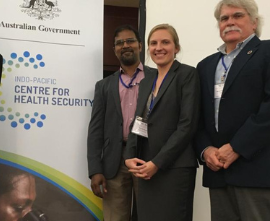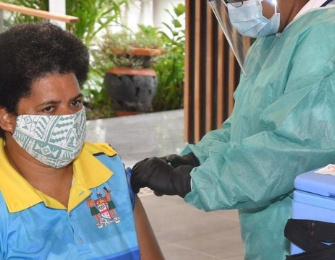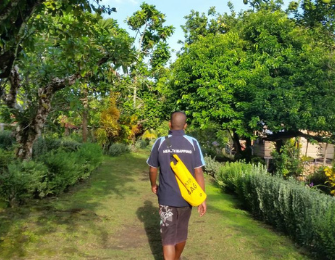A new vector control Landscape Report provides policymakers and researchers with critical insights about steps needed to reduce health security threats posed by vector-borne diseases in the Indo-Pacific.
The report was produced by Innovative Vector Control Consortium (IVCC) with funding from the Indo-Pacific Centre for Health Security, and launched on the sidelines of a Vector Control Platform in Asia Pacific (VCAP) workshop held on 7-8 November 2019 in Hanoi, Vietnam.

The report provides a comprehensive analysis of the status of malaria, dengue, Zika, and other vector-borne diseases, and the opportunities and challenges to controlling them. The World Health Organization estimates that over 400 million people in Southeast Asia and the Pacific were at risk of malaria infection, and 3.5 million people contracted malaria in 2017. Vector control – or the use of tools that reduce the chance that people are bitten by mosquitoes, such as bed nets and spraying insecticide inside houses – has been proven a highly effective method for reducing vector-borne disease.
However, there are growing concerns that changes in mosquito behaviour, as well as growing resistance to the most commonly used insecticides, are placing the continuing effectiveness of current vector control tools in doubt.
The new Landscape Report analyses three interlinked aspects of vector control: the disease burden and distribution of their vectors; the market for vector control products; and the systems in place to regulate these products. It covers 19 countries, with in-depth consultations conducted in six focus countries: Cambodia, Indonesia, Malaysia, Myanmar, Papua New Guinea, and Vietnam.
With respect to malaria, the report found there is significant diversity in mosquito ecology across the region, with the key challenge of mosquitoes shifting to biting outdoors. Although insecticide resistance among the Anopheles mosquitoes that transmit malaria is widespread in South Asia and may be increasing in the Greater Mekong Subregion, most national malaria control programs continue to rely almost exclusively on insecticide-treated bed nets or indoor residual spraying to prevent malaria.
The report also found most countries in the Indo-Pacific lack capacity to detect and control the transmission of dengue, Zika, chikungunya, and other mosquito-borne viruses. Some countries are also faced with high levels of insecticide resistance among the Aedes species of mosquitoes that transmit these viruses.
The market for vector control products in the Indo-Pacific has been found substantial, reflecting the size and economic growth rates of the region. This includes a significant – but highly fragmented – retail market for vector control products (such as mosquito coils, topical repellents, and untreated bed nets), estimated at USD 5.5 billion in 2018.
Regulatory systems and registration processes are also fragmented. The ministries and agencies responsible for regulating the use of insecticides vary from country to country, as do the requirements for registering new products. Some countries lack specifications for vector control products altogether, leaving it up to manufacturers to decide.
The IVCC landscape report was launched as part of a workshop on vector control regulation convened by the Vector Control Platform in Asia Pacific (VCAP). A partnership of the Asia Pacific Leaders Malaria Alliance (APLMA) and Unitaid, VCAP aims to bring together vector-borne disease program representatives, policymakers, regulators, and industry to increase uptake of new, effective vector control tools across the Asia Pacific.
The VCAP workshop in Hanoi brought together representatives from vector control/pesticide agencies and vector-borne disease programs from nine countries as well as regulatory experts from the World Health Organization to exchange knowledge about how vector control tools are reviewed and approved at the global and country levels.


